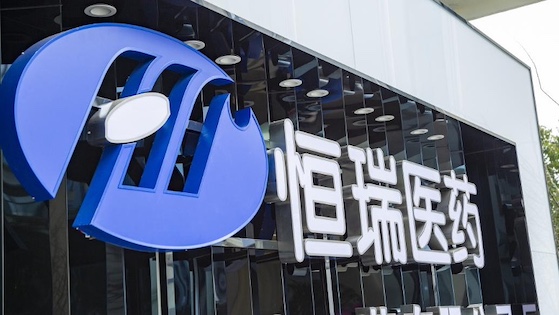Hengrui Medicine’s “JAK1 inhibitor” application for alopecia areata indication has been accepted
September 7, 2024
Source: drugdu
 322
322
 Recently, the drug marketing authorization application for the JAK1 inhibitor amaxitinib sulfate tablets (SHR0302 tablets) was accepted by the State Food and Drug Administration. This product is suitable for adult patients with severe alopecia areata. At present, no JAK1 inhibitor self-developed by domestic companies has been approved for marketing.
Recently, the drug marketing authorization application for the JAK1 inhibitor amaxitinib sulfate tablets (SHR0302 tablets) was accepted by the State Food and Drug Administration. This product is suitable for adult patients with severe alopecia areata. At present, no JAK1 inhibitor self-developed by domestic companies has been approved for marketing.
In addition to the indications for alopecia areata, the marketing authorization application for Amaxitinib Sulfate Tablets has been accepted by the State Food and Drug Administration for three indications, namely: moderate to severe atopic dermatitis in adults and adolescents aged 12 years and above, and ankylosing spine. inflammation and moderate to severe active rheumatoid arthritis.
In June 2024, the main research endpoint of the Phase III clinical trial of Emmaxitinib Sulfate Tablets reached the superiority standard preset in the protocol. This study is a randomized, double-blind, and placebo-controlled Phase III study to evaluate the effectiveness and safety of amaxitinib sulfate tablets in adult patients with severe alopecia areata. It is led by Peking University People's Hospital and is led by Professor Zhang Jianzhong. The principal investigator and 31 centers across the country participated.
This study is divided into a placebo-controlled treatment period (24 weeks) and an extended treatment period (28 weeks). A total of 330 adult patients with severe alopecia areata were enrolled. During the placebo-controlled treatment period, they received 8 mg of emasitinib sulfate tablets once a day. (8 mg QD), aimaxitinib sulfate tablets 4 mg once daily (4 mg QD), and placebo treatments. The primary endpoint was the proportion of subjects with a Severity of Alopecia Tool (SALT) score of ≤20 at 24 weeks. Both the 8 mg and 4 mg dose groups of Amaxitinib Sulfate Tablets were significantly better than the placebo group in the primary endpoint, and the safety and effectiveness of long-term treatment in adult patients with severe alopecia areata are good, which is comparable to other JAK1 inhibitors. No new security signals were discovered.
Alopecia Areata (AA) is a common inflammatory non-scarring alopecia. The clinical manifestations of this disease are: sudden round and patchy hair loss with clear borders on the scalp. Most patients with mild symptoms can recover on their own, but about half of patients have recurring attacks, which can last for years or decades. Epidemiological studies show that the prevalence of AA in my country is 0.27%, and foreign studies show that the lifetime prevalence of AA is about 2%. This disease affects aesthetics and can have a negative impact on patients' mental health and quality of life. According to the Dermatology Life Quality Index survey results, nearly 80% of AA patients report impaired health-related quality of life.
For patients with severe alopecia areata, existing treatments include local immunotherapy, systemic glucocorticoid therapy, and immunosuppressive therapy [2]. Local immunotherapy should be treated for at least 3 to 6 months before the efficacy is evaluated. The effective rate is about 30% to 50%, and there are many adverse reactions, mainly contact dermatitis, lymph node enlargement, pigmentation, etc. Systemic glucocorticoids include oral administration and intramuscular injection, but the relapse rate is higher if the dose is reduced too quickly or the drug is discontinued, and long-term use has many adverse reactions. Immunosuppressants are only effective in some patients, but due to their relatively high number of adverse reactions, relatively high costs, and high recurrence rate after drug withdrawal, they are not used as first-line drugs in clinical practice. Current drugs still cannot meet the needs of patients with severe alopecia areata. There are still some patients who do not respond well to existing drug treatments or terminate treatment due to intolerable adverse reactions. There is an urgent need to develop new effective and safe therapeutic drugs.
Amaxitinib sulfate tablets are highly selective JAK1 inhibitors and belong to the national Class 1 new drugs. They are domestically independently developed oral small molecule innovative drugs with Class I intellectual property rights. They can exert anti-inflammatory and inhibitory effects by inhibiting JAK1 signaling. Biological effects of immunity.
At present, amaxitinib sulfate tablets have been clinically studied in various fields including ulcerative colitis, psoriatic arthritis, etc., and most of them have entered Phase III clinical trials. In 2018, the company licensed the JAK1 inhibitor amaxitinib sulfate (SHR0302) to the American company Arcutis, allowing the company's innovative drugs to benefit patients around the world.
https://news.yaozh.com/archive/44166.html
By editorRead more on
- Gan & Lee Pharmaceuticals’ new PROTAC drug GLR2037 tablets have been approved for clinical trials to enter the field of prostate cancer treatment March 3, 2026
- AideaPharmaceuticals plans to raise no more than 1.277 billion yuan through a private placement to focus on the global clinical development of innovative HIV drugs March 3, 2026
- Giant Exits! Its Star Business Acquired March 3, 2026
- Focusing on cardiovascular and cerebrovascular diseases! OpenMediLead Medical Intelligence Dual Engines Launch Internal Testing, Connecting Drug Development and Clinical Diagnosis in a Closed Loop March 3, 2026
- Innovent Biologics Announces Approval of New Indication for BTK Inhibitor “Pitubrutinib” in China March 3, 2026
your submission has already been received.
OK
Subscribe
Please enter a valid Email address!
Submit
The most relevant industry news & insight will be sent to you every two weeks.



